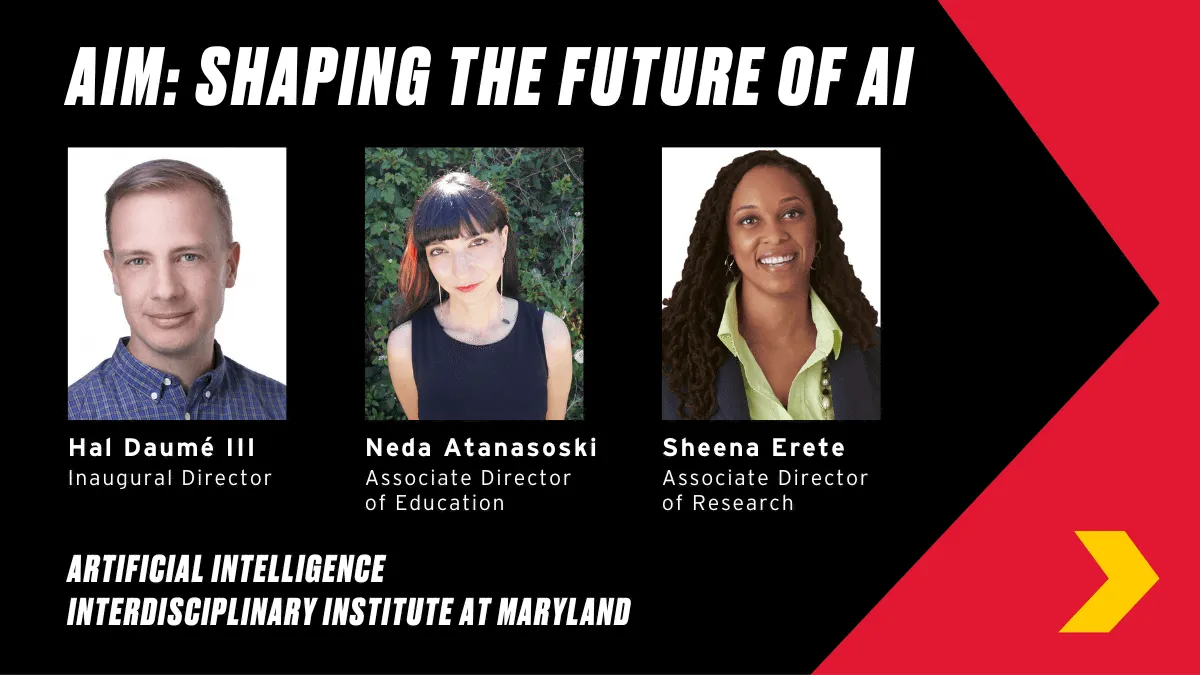Shaping the Future of AI
April 09, 2024

Dear Campus Community,
The rise of artificial intelligence has been meteoric, and the University of Maryland is setting the pace as a top 15 university for AI in the nation.
As we continue to adopt AI into our scholarship and education, we also adapt. We measure the impact on every field of study, industry and individual. Here at the University of Maryland, we have hundreds of faculty members who study and teach AI, and our location just outside of the nation’s capital puts us right at the nexus of this transformative era.
Mirroring the state of Maryland’s ambition to be a leader in this domain, we are proud to announce the new Artificial Intelligence Interdisciplinary Institute at Maryland (AIM), dedicated to developing the next generation of artificial intelligence education, technology and leaders.
Our vision for AIM
AIM will support interdisciplinary research and education that promote responsible, ethical and trustworthy AI and prepares the future workforce for an AI-infused world. We will lead in the development and ethical application of emerging AI technologies, systems, policies and practices across fields and we will be a magnet for AI-focused work and industry. AIM will also focus on educating and supporting all campus community members seeking to better understand and leverage breakthrough data science AI technologies.
What makes us unique
Many research universities are claiming their stake in AI, and our approach at Maryland will be impactful and distinct. Here’s why:
- Interdisciplinary from the start. AIM will center faculty from a large range of disciplines as full partners. The vision for AIM came about through the efforts of a multidisciplinary work group, and was refined through a collaborative process with the deans of all 12 colleges and schools. The institute will take advantage of UMD's breadth of expertise and enhance connections between AI leaders in fields of study across campus, from computer science and engineering to information studies, journalism, education and the arts.
- A focus on responsible use. AI is here to stay and will continue to grow at an exponential rate. There is no guarantee that it will be used in ethical and responsible ways. In the wake of both President Biden’s and Maryland Governor Moore’s calls to catalyze responsible use and mitigate the risks of AI, we are ready to meet the moment. AIM will focus on the implications of this work from the standpoint of ethics, human values, and social policy, and the use of AI for the public good.
- More than research and discovery. We are rooted in AI expertise and research on our campus, and AIM will place special emphasis on the importance of AI education. We are democratizing AI across the curriculum so every student has the opportunity to understand AI technology and how it applies to their field. By taking this approach, we are preparing our students to be valuable contributors to the workforce and responsible citizens of the world.

Please join us in congratulating Hal Daumé III, a Volpi-Cupal Family Endowed Professor in the Department of Computer Science, who will serve as AIM’s inaugural director. We have appointed Neda Atanasoski, professor and chair of the Harriet Tubman Department of Women, Gender and Sexuality Studies, as associate director of education, and Sheena Erete, an associate professor in the College of Information Studies, as associate director of research. AIM will be administratively housed in the College of Computer, Mathematical, and Natural Sciences, led by Dean Amitabh Varshney.
As the flagship university in the state of Maryland and as a leading public research institution, we have an opportunity to shape AI research and education in ways that advance the public good. Join us in this ambitious vision in moving artificial intelligence fearlessly forward.
Sincerely,
Darryll J. Pines
President, University of Maryland
He/Him/His
Jennifer King Rice
Senior Vice President and Provost
She/Her/Hers
